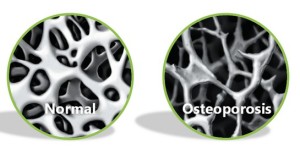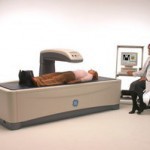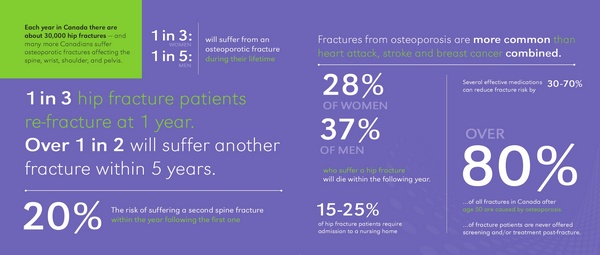WHAT IS OSTEOPOROSIS?

Osteoporosis is a disease where a person’s bones are weak and brittle. People with osteoporosis are at a high risk of breaking their bones, especially the hip, spine, wrist and shoulder.
Osteoporosis does not develop overnight. You can lose bone strength steadily for many years without experiencing any symptoms or signs of the disease until it is too late and a bone fractures. By that time, it is too late to turn back the clock, so prevention is key! (see below).
Note: Osteoporosis is sometimes confused with “osteoarthritis”, because the names are sound similar. Osteoporosis is a disease of brittle bones, whereas osteoarthritis is the arthritis that causes pain from ‘wear on tear’ on a person’s joints.
For more information, be sure to visit OSTEOPOROSIS CANADA’s website.
PREVENTION IS KEY!
Keeping your bones strong is important at any age, but it is very important after the age of 50. It is especially important to women after menopause, because that is when bones are at even greater risk of becoming weaker.
There are many things you can do to strengthen your bones and prevent them from becoming weaker:
- Consider taking Vitamin D. It is a simple over-the-counter vitamin. Aim for 1000-2000 units per day. (NOTE: Vitamin D has been a recommendation for years, however there is mounting evidence to suggest that Vitamin D supplementation does not actually help. An updated review of the evidence in 2024 decisively concluded that Vitamin D does NOT actually help).
- Make sure you are getting enough Calcium
 in your diet. CLICK HERE TO CALCULATE how much calcium you are getting in your daily diet. Aim for at total of 1000mg per day, which most people actually do get through their normal diets. If you do not get enough in your diet, you could consider supplementing with over-the-counter tablets.
in your diet. CLICK HERE TO CALCULATE how much calcium you are getting in your daily diet. Aim for at total of 1000mg per day, which most people actually do get through their normal diets. If you do not get enough in your diet, you could consider supplementing with over-the-counter tablets.
- Get regular EXERCISE.
- Quit SMOKING. Smoking is a huge risk for causing brittle bones.
- Limit alcohol intake (no more than 2 drinks per day for males and no more than 1 drink per day for females).
- Limit caffeine intake. Caffeine weakens bones too.
HOW DO WE TEST FOR OSTEOPOROSIS?
The strength of your bones can be detected by a “Bone Mineral Density” test. This is like a fancy x-ray of your hip and lower spine that tells us how dense your bones are. It does not hurt one bit!
Every woman over the age of 65 and man over the age of 70 should have a Bone Mineral Density test.  It is also recommended for some people younger than 65 who have certain risk factors.
It is also recommended for some people younger than 65 who have certain risk factors.
WHAT ABOUT PRESCRIPTION MEDICATIONS?
If you already have osteoporosis, it is important to prevent your bones from becoming weaker, as suggested above. However, you will also benefit from taking a prescription medication to help keep your bones strong. The most common is a pill that you take only once per WEEK. This type of medication is called a “bisphosphonate“. Click here for more information on bisphosphonate and other medications. Speak to your doctor for more information.

